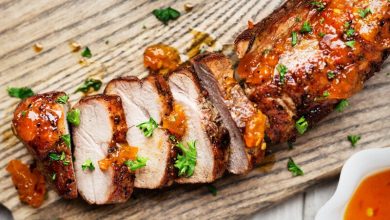🥕 Asian Carrots: A Culinary Delight 🥕
Asian carrots are a unique and delicious variety of carrots, known for their distinct flavor, vibrant color, and versatility in Asian cuisine. Let’s explore the history, components, preparation steps, and time required to prepare this delightful ingredient.
📜 History:
Asian carrots, also called “Korean carrots,” have their roots in Korean cuisine, although they are now enjoyed across various Asian countries. They are often associated with banchan, the assortment of side dishes commonly served with Korean meals. The popularity of Asian carrots has grown, and they are now used in a wide range of Asian-inspired dishes worldwide.
🥕 Components:
Asian carrots are primarily made with common orange carrots, but they have a unique twist. They are typically prepared with the following components:
-
Carrots: Fresh, firm, and vibrant orange carrots are the primary ingredient. They’re often julienned into long, thin strips for a distinctive texture.
-
Seasonings: Asian carrots are known for their bold flavors. They are seasoned with ingredients like garlic, ginger, rice vinegar, soy sauce, sesame oil, sugar, and red pepper flakes to create a sweet, tangy, and slightly spicy taste.
-
Sesame Seeds: Toasted sesame seeds are commonly sprinkled on top of Asian carrots for added flavor and a pleasant crunch.
-
Vegetable Oil: A neutral vegetable oil, such as canola or grapeseed oil, is used for sautéing and mixing the carrots with the seasonings.
👩🍳 Steps to Prepare Asian Carrots:
Preparing Asian carrots is a relatively simple process, and it’s perfect for adding a burst of flavor to your meals. Here are the steps:
-
Prep the Carrots: Start by peeling and julienned the carrots into long, thin strips. You can also use a mandoline for uniform cuts.
-
Sauté the Carrots: Heat vegetable oil in a pan or wok over medium heat. Add the julienned carrots and sauté for a few minutes until they become slightly tender.
-
Prepare the Seasoning: In a separate bowl, mix together garlic, ginger, soy sauce, rice vinegar, sugar, and red pepper flakes to create the flavorful seasoning sauce.
-
Combine and Cook: Pour the seasoning sauce over the sautéed carrots and stir well to ensure the carrots are evenly coated. Cook for a few more minutes until the carrots are tender but still have a slight crunch.
-
Garnish: Sprinkle toasted sesame seeds over the cooked carrots for added flavor and texture.
-
Serve: Asian carrots can be served as a side dish, in rice bowls, salads, or even as a topping for sandwiches.
⏰ Preparation Time:
The time needed to prepare Asian carrots depends on your cooking skills and the quantity you’re making. On average, it takes about 20-30 minutes from start to finish, making it a relatively quick and easy addition to your meals.
Enjoy your homemade Asian carrots – they’re not only delicious but also an excellent way to add a pop of color and flavor to your Asian-inspired dishes! 🥕🍽️😋
Certainly! Here are the nutrition facts and health information for Asian carrots, considering the basic ingredients and components typically used in this dish:
Nutrition Facts (Per Serving, approximately 1/2 cup):
- Calories: Approximately 60-70 calories
- Total Fat: 4-6 grams
- Saturated Fat: 0.5-1 gram
- Trans Fat: 0 grams
- Cholesterol: 0 milligrams
- Sodium: Approximately 350-400 milligrams
- Total Carbohydrates: 6-8 grams
- Dietary Fiber: 1-2 grams
- Sugars: 4-5 grams
- Protein: 1-2 grams
Key Health Information:
-
Low in Calories: Asian carrots are relatively low in calories, making them a suitable choice for those looking to maintain or lose weight.
-
Moderate Healthy Fats: The dish contains moderate amounts of healthy fats, primarily from the sesame oil used. These fats are heart-healthy and contribute to the rich flavor.
-
No Cholesterol: Asian carrots are cholesterol-free, which is good for heart health.
-
Sodium Consideration: The sodium content in Asian carrots may be relatively high due to the use of soy sauce. It’s essential to be mindful of sodium intake, especially for individuals with hypertension or high blood pressure.
-
Dietary Fiber: The presence of dietary fiber from carrots contributes to digestive health and helps keep you feeling full.
-
Vitamins and Minerals: Carrots are a great source of essential vitamins and minerals, especially vitamin A (from beta-carotene), vitamin K, and potassium. The seasoning ingredients like garlic and ginger also add unique health benefits, such as anti-inflammatory and antioxidant properties.
-
Antioxidants: The garlic and ginger in Asian carrots have antioxidant properties that may help protect cells from damage and reduce the risk of chronic diseases.
-
Spices for Flavor: The use of ginger and red pepper flakes can add a spicy kick to the dish. Ginger is known for its potential anti-nausea and anti-inflammatory effects, while red pepper flakes can provide a metabolism boost.
-
Sugar Content: Asian carrots may have added sugar in the seasoning. It’s important to consume added sugars in moderation as excessive sugar intake can contribute to various health issues.
Remember that these nutrition facts and health information can vary based on the specific recipe and portion size. If you have specific dietary concerns or health goals, it’s a good practice to adjust the recipe to meet your nutritional needs.



